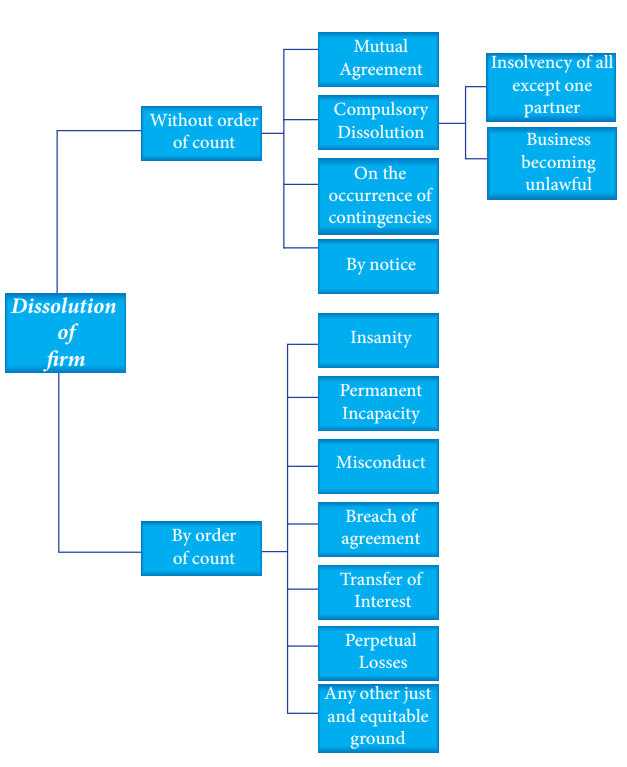Commerce - Dissolution of Partnership | 11th Commerce : Chapter 5 : Hindu Undivided Family and Partnership
Chapter: 11th Commerce : Chapter 5 : Hindu Undivided Family and Partnership
Dissolution of Partnership
Dissolution of Partnership
Dissolution of Partnership is different
from the dissolution of partnership firm. It is due to the fact that when the
relation present between all partners, comes to an end, it is known as dissolution of firm. When any
one of the partners become incapacitated, then the partnership comes to an end,
but the firm may continue to operate, if new partnership is arranged among the
other partners.
a. Dissolution of firm
Dissolution of
firm means dissolution
of partnership. On dissolution of firm, partnership business comes to an
end. Its assets are realised and the creditors are paid off. The business
cannot be continued after dissolution of partnership firm. For example A, B and
C are partners in a business. If all the three partners decide to dissolve, it
is known as “dissolution of the firm”.
b. Dissolution of partnership
Dissolution of partnership means the termination of the original partnership agreement. A partnership is dissolved by insolvency, retirement, expiry or completion of the term of partnership. The business will continue after dissolution of partnership. For example: A, B and C are partners in a business. If ‘A’ retires, ‘B’ and ‘C’ can continue the business which is known as dissolution of partnership.

The various circumstances leading to
dissolution of partnership firm can be summarised by taking the first letters
used in the term “Dissolution”.
D - Death of partner
I - Incapacity of a partner
S
- Stipulated period of
partnership completed in the case of particular partnership
S - Serious misconduct of a partner
O - Object is completed (Particular
partnership)
L - Lunacy of a partner
U - Unavoidable continuous loss
T - Transfer of interest of the firm
I - Insolvency of a partner
O - Objectionable unlawful objectives
N - Notice of dissolution by a partner.
The fundamental difference between the
dissolution of partnership and dissolution of the firm is that when the
partnership is dissolved, there is no other dissolution, but when the firm is
dissolved, partnership too comes to an end.
Dissolution of Partnership can take the following forms
·
Change in the existing profit sharing
ratio
·
Admission of a Partner
·
Retirement or Death of a Partner
·
Insolvency of a partner.
·
Expiry of the term of the partnership.
·
Completion of the specified venture.
·
Dissolution by agreement.

Dissolution of a partnership firm is taken place in two ways.
a. without the order of the court and
b. By order of the court.
a. Without the order of the court
i. By agreement or mutual consent
A firm may be dissolved when all the
partners agree to close the affairs of the firm. Just as a partnership is
created by contract, it can also be terminated by contract.
ii. By insolvency of all the partners but one
If any of the partners adjudged an
insolvent (or if all the partners become insolvent) it is necessary to dissolve
the firm.
iii. When the objective becomes illegal
When the business carried on by the
partnership becomes illegal, the partnership firm is automatically dissolved.

iv. By notice of dissolution
In the case of partnership at will when
any partner gives in writing to all the other partners indicating his intention
to dissolve the firm, the firm will be dissolved.
v. On certain contingencies:
Dissolution of partnership itself may
involve the dissolution of the firm unless parties agree to continue it
otherwise, it will take place.
a.
On the expiry of a specified period in
case of partnership for a fixed term.
b.
On the completion of a particular adventure
for which it has been formed
c.
in case of particular partnership.
d.
On the death of a partner.
e.
On the retirement of a partner.
f.
On the insolvency of a partner.
In all the above cases if the
business is not continued by the
remaining partners, dissolution of the firm takes place automatically.
b. Dissolution through court
The court may order dissolution of a firm
at a suit of a partner in any of the following circumstances.
a.
When a partner becomes insane
b.
Permanent incapacity of any partner
c.
Misconduct of any partner
d.
Breach of agreement which makes the
business impracticable
e.
Transfer of interest to third person
f.
Continued loss
g.
When the court finds that it is just and
equitable to dissolve the firm
Related Topics